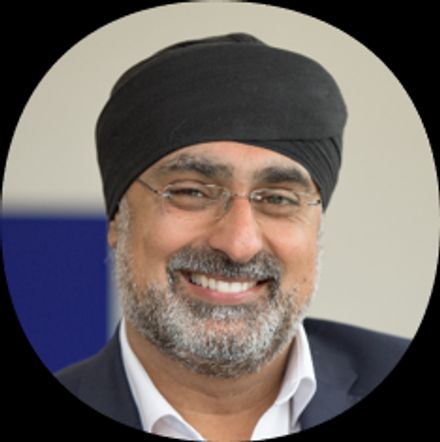Why healthcare must build trust with the LGBTQ+ community

There is a crisis of trust in healthcare among people within the LGBTQ+ community. That’s one of many reasons why we launched A Million Conversations: our eight-year, global initiative to build trust in healthcare by giving under-represented people a voice, engaging with the industry, and supporting the next generation of diverse healthcare leaders.
A positive healthcare experience is built on trust
We initiated A Million Conversations by asking 11,500 people in Brazil, France, Japan, the UK, and the U.S. about their experiences. The survey results were clear: three quarters of people from under-represented groups – based on their gender, age, ethnic background, disabilities, and LGBTQ+ identity – said they had suffered trust-damaging healthcare experiences.
Survey: LGBTQ+ trust in healthcare
Listening to what our LGBTQ+ respondents have to say tells us there’s work to be done:
- 66% of people who identify as LGBTQ+ have had their trust damaged by negative healthcare experiences (69% of people who identify as transgender or non-binary)
- 22-point trust gap between people who identify as both LGBTQ+ and disabled, compared to those who are from neither group
- 25-point trust gap between people who are both LGBTQ+ and from ethnic minority backgrounds, compared to those who are not
- Respondents who self-identified as transgender, non-binary, and ‘other’ said the two greatest factors behind their negative experiences were their gender (49% compared with 25% for our total sample) and sexual orientation (41% compared with 21%)

Infographic shows 25-point trust gap between people who are both LGBTQ+ and from ethnic minority backgrounds, compared to those who are not
“I used to live in Chicago, where healthcare providers can self-identify as being LGBTQ+ friendly,” said Jake Prodoehl, Global Marketer in Neurology and Pride+ Employee Resource Group (ERG) lead. “I would go out of my way to see one of those physicians where I knew I wouldn’t be treated differently because my fiancé is a man.”
“Sadly, there are many countries and regions around the world where that’s not the case. People walk into a physician's office, and they feel they can’t disclose who they really are without judgment and prejudice.”
How can healthcare begin to rebuild trust?
Jake lives in a progressive city. Yet, distrust in healthcare is prevalent among LGBTQ+ people around the world, including in many parts of the United States. Our survey results are particularly troubling in light of studies that show discrimination’s lasting impact on people’s personal lives, careers, and access to critical healthcare.
A study by the Center for American Progress found that 15% of LGBTQ+ Americans reported postponing or even avoiding medical treatment due to discrimination. This concerning figure leapt to nearly 30% among transgender individuals.1
A lack of education is a recurring theme. In the above study transgender respondents reported needing to teach their doctor about what it means to be transgender in order to receive appropriate care.
Healthcare professionals themselves report a gap in training that can leave them unable to provide appropriate care.2 In one study, less than half (41%) of medical students reported having received any teaching on LGBTQ+ healthcare at all. As a result, just one in eight felt their knowledge and skills on LGBTQ+ healthcare were sufficient. However, 97.2% were motivated to know more.
So, with a gap in both trust and knowledge, what needs to change and how can Sanofi help make that happen?
We know that representation matters. Education matters too. Simply, if we want to build trust with patients of all backgrounds, we must train, hire and empower healthcare professionals of all backgrounds.
This is why A Million Conversations will see us invest in the Sanofi NextGen Scholarship - a world-first program to support young people from marginalized groups on their journey to becoming healthcare leaders. Including those who identify as LGBTQ+. Not only will we provide financial support, we will open doors to mentorship, leadership training and future career opportunities at Sanofi.
“At Sanofi we chase the miracles of science to improve people’s lives and transform the practice of medicine. But to do this for everyone, we must tackle the issues that prevent communities from getting equal access to healthcare. Issues that prevent under-represented groups from trusting their healthcare providers,” says Raj Verma, our Chief Diversity Officer. “There’s a long way to go, but we’re committed to helping close the trust gap with our €50m initiative A Million Conversations.”
We must tackle the issues that prevent communities from getting equal access to healthcare. Issues that prevent under-represented groups from trusting their healthcare providers. There’s a long way to go, but we’re committed to helping close the trust gap.

Raj Verma
Chief Diversity Officer
We don’t have all the answers. So at the root of our initiative is the power of conversation. The healthcare industry must talk with LGBTQ+ people, listen to their experiences and ensure these are heard by those in positions of power.
What’s next?
We’re making it our mission to support a diverse healthcare workforce. But we need others to join us. We’re building a coalition of nonprofits, activists, businesses and governments to get to the bottom of the ‘trust gap’.
Contact us to find out more
Explore A Million Conversations

A Million Conversations

Three steps to begin closing the trust gap

A Million Conversations: How we’re bridging the healthcare ‘trust gap’ with marginalized communities
References
- Center for American Progress (2020). State of the LGBTQ Community Report
- Barber, Flach, Bonnington and Pattinson (2023). LGBTQ+ Healthcare Teaching in UK Medical Schools